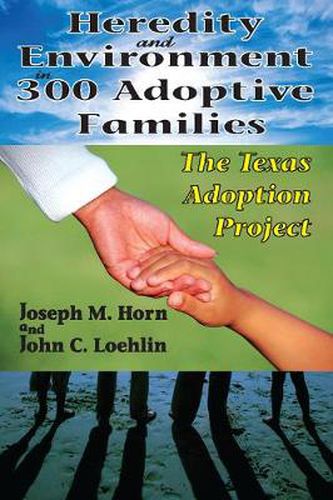Readings Newsletter
Become a Readings Member to make your shopping experience even easier.
Sign in or sign up for free!
You’re not far away from qualifying for FREE standard shipping within Australia
You’ve qualified for FREE standard shipping within Australia
The cart is loading…






This book presents the results of a thirty-five-year research project involving 300 families, each of whom adopted at least one child at birth from a Texas home for unwed mothers during the period of 1962-1970. The book weaves together information about the birth parents of the adopted children; information about the adoptive parents; and information about the children in these families. Children adopted at birth have two sets of parents. Birth parents provide their adopted-away child with a genetic endowment, but do not participate in shaping the child’s environment. Adoptive parents do not contribute genetically, but are otherwise in charge of directing the child’s development. If adopted children grow up to resemble birth parents they have never seen, the clear inference is that hereditary factors have had an influence. Environmental factors are implicated whenever children resemble their adoptive parents, but not the birth parents. The Texas Adoption Project was designed to investigate the impact of genetic and environmental factors. This unique and innovative longitudinal study is written for specialists and the educated public. An introductory guide is provided for the non-specialist reader explaining the form and statistical content of the tables. Additional technical material for specialists is contained in appendices. This important contribution to the literature on adoption will also be of interest to those interested in the relative weight of genetics and environment in human development.
$9.00 standard shipping within Australia
FREE standard shipping within Australia for orders over $100.00
Express & International shipping calculated at checkout
This book presents the results of a thirty-five-year research project involving 300 families, each of whom adopted at least one child at birth from a Texas home for unwed mothers during the period of 1962-1970. The book weaves together information about the birth parents of the adopted children; information about the adoptive parents; and information about the children in these families. Children adopted at birth have two sets of parents. Birth parents provide their adopted-away child with a genetic endowment, but do not participate in shaping the child’s environment. Adoptive parents do not contribute genetically, but are otherwise in charge of directing the child’s development. If adopted children grow up to resemble birth parents they have never seen, the clear inference is that hereditary factors have had an influence. Environmental factors are implicated whenever children resemble their adoptive parents, but not the birth parents. The Texas Adoption Project was designed to investigate the impact of genetic and environmental factors. This unique and innovative longitudinal study is written for specialists and the educated public. An introductory guide is provided for the non-specialist reader explaining the form and statistical content of the tables. Additional technical material for specialists is contained in appendices. This important contribution to the literature on adoption will also be of interest to those interested in the relative weight of genetics and environment in human development.